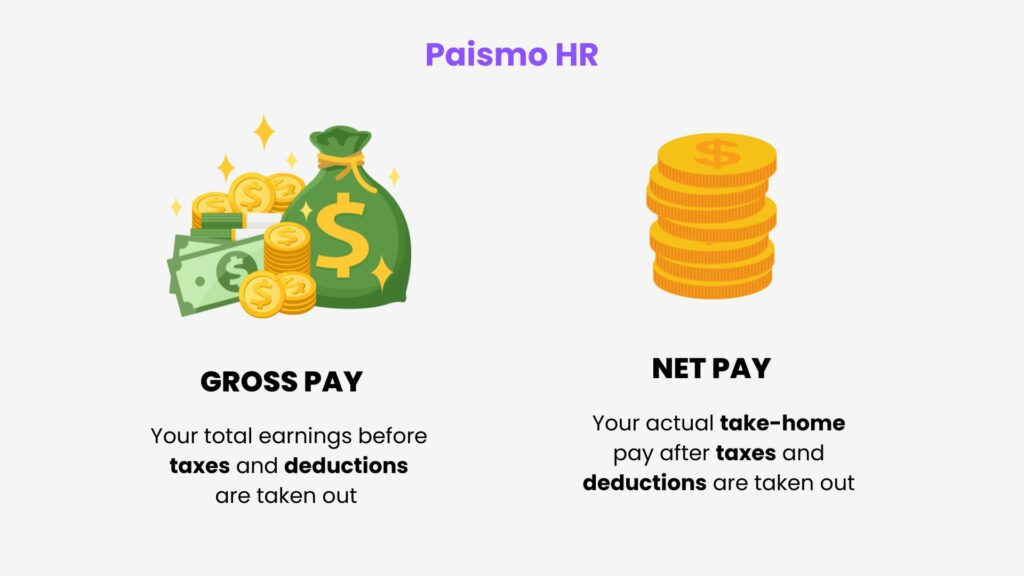Understanding the distinction between gross salary vs net salary is crucial for anyone navigating the world of personal finance, job negotiations, or simply managing their budgets. Gross salary refers to the total amount an employee earns before any deductions, while net salary is the take-home pay received after all taxes and deductions have been applied.
Recognizing the difference between gross salary and net salary ensures that employees are fully aware of their earnings and can plan their finances accordingly based on their payroll cycles. This blog will explore gross and net salary nuances, highlighting their importance in financial planning and employment negotiations.
Gross Salary vs Net Salary: Key Definitions
When discussing financial compensation, it’s essential to differentiate between gross salary vs net salary. Understanding these terms helps employees make informed decisions about their earnings and financial planning.
Gross Salary
Gross salary refers to the total amount an employee earns before any deductions. It encompasses all forms of income, including basic salary, bonuses, overtime pay, and any other allowances. For example, if an employee has a monthly salary of $5,000 plus a $500 bonus, their gross salary would total $5,500. This figure is crucial when negotiating job offers with HR, as it reflects the overall compensation package, including all potential earnings an employee might receive.
Net Salary
In contrast, net salary is the amount an employee takes home after all deductions are made from their gross salary. These deductions can include federal and state taxes, social security contributions, health insurance premiums, and retirement savings. Using the previous example, if the $5,500 gross salary has $1,200 taken out for taxes and other deductions, the net salary would be $4,300. Understanding the difference between gross salary and net salary is vital, as net salary significantly impacts an individual's budgeting and financial planning.
In summary, while gross salary vs net salary might seem similar at first glance, recognizing their differences is key to understanding one's true earning potential and financial health.
Key Differences Between Gross Salary and Net Salary
Understanding the key differences between gross salary vs net salary is essential for anyone navigating the employment landscape. These two figures play a significant role in determining an individual's overall financial health and budgeting capabilities.
Breakdown of Elements Included in Gross and Net Salary
Gross salary includes all forms of compensation an employee receives before any deductions. This typically encompasses the time and attendance, base salary, bonuses, overtime pay, allowances, and any additional incentives. In contrast, net salary represents the amount left after all applicable deductions have been subtracted from the gross salary. This means that while gross salary might look impressive on paper, the net salary is what employees actually take home and can utilize for their expenses.
Importance of Understanding Both Figures
Grasping the distinctions between gross salary vs net salary is crucial for effective financial planning and job evaluation. Employers often highlight gross salary to attract candidates, which might lead to misunderstandings regarding actual take-home pay. An employee who understands the difference can better budget and manage their finances according to their real income. Moreover, by being aware of their gross and net salary, individuals can make informed decisions about job offers, evaluate potential raises or bonuses, and assess their overall job satisfaction and performance in relation to their actual earnings.

In conclusion, the disparity between gross salary vs net salary underscores the importance of understanding not just how much you earn, but how much you actually receive. This awareness can lead to smarter financial choices and greater peace of mind in managing one's finances.
Why Gross Salary Matters
Understanding the nuances between gross salary vs net salary is crucial for both job seekers and employers during negotiations. Gross salary encompasses the total earnings before any deductions such as taxes, health insurance, or retirement contributions. This figure serves as a benchmark for evaluating job offers since it reflects the overall compensation package and potential earnings an employee can expect to receive.
When discussing gross salary vs net salary, it's important to recognize that gross salary provides a clearer picture of an employee’s total earnings potential. For example, two job offers may have similar gross salaries, but the net salary, the amount the employee takes home after deductions, can differ significantly based on benefits, tax implications, or additional compensatory items. Hence, being aware of gross salary vs net salary allows candidates to make informed decisions when comparing job offers regardless of the payroll schedule.
Importance of Net Salary
When considering financial health, understanding the difference between gross salary and net salary is crucial. Gross salary refers to the total earnings before any deductions, while net salary is the actual amount received after taxes, social security contributions, and other deductions are taken out. The distinction between these two figures highlights the importance of net salary as it directly affects real take-home pay.
Real Take-Home Pay and Budgeting
Net salary is fundamental for budgeting as it represents the real income that individuals and families have to manage their expenses. Knowing your net salary allows you to create a more accurate budget, ensuring that all necessary costs such as housing, utilities, groceries, and transportation can be covered. Without this clarity on gross salary vs net salary, individuals may overestimate their financial capabilities, leading to inadequate planning and potential financial strain.
Impact on Financial Planning and Lifestyle Choices
The impact of net salary on financial planning cannot be overstated. It determines not just day-to-day spending but also long-term goals like saving for retirement, purchasing a home, or investing in education. For instance, if someone relies solely on their gross salary for financial decisions, they might be unprepared for the realities of their financial situation. Thus, understanding the gross salary vs net salary difference empowers better lifestyle choices, helping individuals align their aspirations with their actual income.
Consider a professional earning a gross salary of $80,000 annually. After deductions for taxes, health insurance, and retirement contributions, their net salary might only be $56,000. This figure translates to approximately $4,666 per month. With this net salary, they need to manage their mortgage, daily expenses, and savings goals, which requires careful consideration of their financial priorities. A clear grasp of what their net earnings are allows for more effective financial management and a clearer picture of what lifestyle choices can be realistically pursued.
To conclude
In today's competitive job market, understanding the distinction between gross salary and net salary is crucial for making informed financial decisions. Gross salary refers to the total amount an employee earns before any deductions, such as taxes, retirement contributions, and health insurance. In contrast, net salary is the amount that an employee takes home after all deductions have been applied. This differentiation between gross salary vs net salary is vital, as it directly impacts your financial planning and budgeting.
When evaluating job offers, it is essential to look beyond the gross salary figure. A higher gross salary may seem attractive at first glance, but if the net salary is significantly lower due to high deductions or insufficient benefits, the overall compensation package may not be as favorable as it appears. Therefore, understanding the nuances of gross salary vs net salary can help you assess the true value of a job offer.
Moreover, incorporating both gross and net salary into your personal finances will provide a clearer picture of your financial health. By analyzing both figures, you can create a more accurate budget that reflects your actual earnings and expenses. Always remember that while gross salary can give you an idea of potential income, it is the net salary that determines your day-to-day financial reality.
Become a part of the Paismo community
Paismo can help simplify your HR processes. In today's dynamic economic environment, efficient HR and automated payroll management are no longer a luxury but a necessity. Paismo is a comprehensive solution that transforms traditional HR complexes into streamlined and automated workflows. Paismo and its paired biometric devices can be used for your business to mark employee attendance and record their timesheets accurately.
Paismo simplifies your tasks with its core HRMS, timesheets, and attendance management, as well as biometric attendance, payroll automation, and leave management system.
Take the first step toward modernizing your HR and payroll processes and explore what Paismo can do for you. Book a demo with our exceptional sales team here.









